Outpatient Training
In addition to the 2 months of dedicated outpatient experience through the Veteran Affairs Medical Center (VAMC) Pulmonary Acute Care Clinic (PACC), trainees will have their individual continuity clinics at Boston Medical Center (BMC), comprising one half-day session per week. Trainees will staff patients longitudinally with a faculty preceptor who will also serve as a coach and advisor over the three years of fellowship training. During the first year, trainees will also gain experiencing rotating through 2 core subspecialty clinics consisting of Tuberculosis clinic and Sleep clinic, both at BMC. During the second year, trainees will also maintain a continuity clinic at the VAMC, comprising one half-day session every other week. Lastly, during the third year, trainees will have the option of rotating through other subspecialty clinics including thoracic oncology, pulmonary hypertension, interstitial lung disease, alpha-1 antitrypsin deficiency, and amyloidosis.
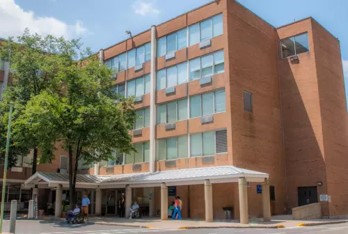 |
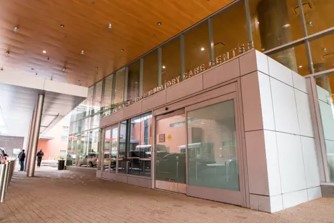 |
Core Outpatient Clinic Experiences
BMC Longitudinal Clinic
The purpose of the BMC Longitudinal Clinic is to provide a diverse clinical experience in outpatient management of pulmonary diseases that is integrated with case-based learning, clinic highlights, conferences, literature, and web-based resources. A significant part of training is obtained through the process of history-taking, physical examination, record and imaging review, and in honing and adapting these skills for the relevant clinical issues. This involves learning to integrate the information obtained and formation of a clinical impression with a differential diagnosis ordered according to likelihood. Each trainee is matched with a teaching attending who serves as the clinic preceptor for all three years. Trainees typically see 6-8 patients per 4-hour session and will be responsible for primary evaluation of patients and development of initial assessments and plans to be discussed with the preceptor.
BMC Tuberculosis Clinic
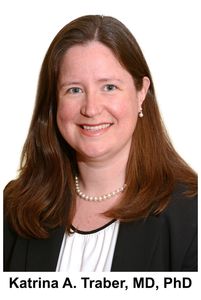 The BMC tuberculosis (TB) clinic is a collaborative effort between the Section of Pulmonary, Allergy, Sleep & Critical Care Medicine and the Section of Infectious Disease at Boston University Avedisian & Chobanian School of Medicine, and the Boston Public Health Commission (BPHC). The BMC TB clinic is the largest in Massachusetts, caring for over a thousand new patients annually, including on average 40 cases of active TB. Patients are referred to the TB clinic from multiple hospitals and community-based clinics in the greater Boston area. The staff of the TB clinic is comprised of physicians with expertise in both infectious disease and pulmonary medicine, and nurses and outreach workers from the BPHC. The clinic provides evaluation after initial positive TB screening, active TB diagnosis, and management of latent and active TB, including management of complex cases of multidrug-resistant tuberculosis.
The BMC tuberculosis (TB) clinic is a collaborative effort between the Section of Pulmonary, Allergy, Sleep & Critical Care Medicine and the Section of Infectious Disease at Boston University Avedisian & Chobanian School of Medicine, and the Boston Public Health Commission (BPHC). The BMC TB clinic is the largest in Massachusetts, caring for over a thousand new patients annually, including on average 40 cases of active TB. Patients are referred to the TB clinic from multiple hospitals and community-based clinics in the greater Boston area. The staff of the TB clinic is comprised of physicians with expertise in both infectious disease and pulmonary medicine, and nurses and outreach workers from the BPHC. The clinic provides evaluation after initial positive TB screening, active TB diagnosis, and management of latent and active TB, including management of complex cases of multidrug-resistant tuberculosis.
TB clinic with Dr. Katrina Traber is on Monday afternoons. Trainees rotate through the BMC TB clinic during their first year, attending on average 8 sessions during the year. Their role is to evaluate both new and established patients and assist in management of TB. Trainees wishing to receive additional training in outpatient TB management are welcome to arrange rotations throughout fellowship.
BMC Sleep Clinic
The BMC sleep clinic will give trainees an opportunity to learn about the diagnostic and management approaches of sleep-disordered breathing, including obstructive sleep apnea, obesity hypoventilation syndrome, and central sleep apnea. They will learn how to evaluate and manage other sleep conditions including snoring, restless legs syndrome, insomnia, narcolepsy, abnormal behaviors during sleep, and circadian rhythm disorders. Trainees will also learn about behavioral factors that can influence sleep. They will learn practical skills including how to read a sleep study report, a compliance report and how to assess and manage non-compliance with CPAP.
Sleep clinic with Dr. Eric Heckman is on Wednesday mornings/afternoons. Trainees rotate through the BMC Sleep clinic during their first year, attending on average 8 sessions during the year. Their role is to evaluate both new and established patients. Trainees interested in pursuing formal training in Sleep Medicine, can also apply for the Sleep Medicine Fellowship offered through the Neurology Department upon completion of their pulmonary and critical care fellowship.
VAMC Outpatient / Pulmonary Acute Care Clinic / Pulmonary Continuity Clinic
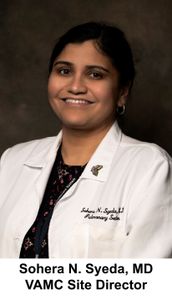 At the VAMC Pulmonary Acute Care Clinic (PACC), the fellow performs outpatient consults and outpatient pulmonary workups. In this role, fellows will also participate in a variety of outpatient procedures including referral for bronchoscopy, pleural biopsies, and/or thoracenteses. Fellows are directly responsible for the evaluation and presentation of new lung cancer cases to the multidisciplinary Tumor Board. The clinic also has medical residents that rotate through, and the clinic is supervised daily by a pulmonary attending. Since physicians throughout New England refer patients to this clinic, there is a rich and diverse array of pulmonary pathology.
At the VAMC Pulmonary Acute Care Clinic (PACC), the fellow performs outpatient consults and outpatient pulmonary workups. In this role, fellows will also participate in a variety of outpatient procedures including referral for bronchoscopy, pleural biopsies, and/or thoracenteses. Fellows are directly responsible for the evaluation and presentation of new lung cancer cases to the multidisciplinary Tumor Board. The clinic also has medical residents that rotate through, and the clinic is supervised daily by a pulmonary attending. Since physicians throughout New England refer patients to this clinic, there is a rich and diverse array of pulmonary pathology.
During the second year, trainees will also maintain a pulmonary continuity clinic at the VAMC, comprising one half-day session every other week. Its purpose is to establish longitudinal follow-up and medical management of patients often initially evaluated at the VAMC PACC.
Optional Outpatient Clinic Experiences
BMC Pulmonary Hypertension Clinic
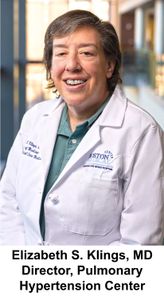 The Pulmonary Hypertension (PH) clinic (aka the Pulmonary Hypertension Center) at BMC will offer trainees the opportunity to evaluate and manage patients with PH from both within BMC and area throughout New England and beyond. Some patients come only for an initial evaluation or second opinion, while others may be followed for years. Approximately 100-150 new referrals per year are seen at the PH clinic at BMC. Trainees who choose to rotate through PH clinic will learn and gain experience in the initial assessment of patients with PH, use of oral, inhaled and systemic therapies for PH when indicated, as well as ongoing treatment for PH including clinical follow-up with 6-minute walk tests, echocardiography, right heart catheterizations, and referral for lung transplant as needed. Trainees will also have the opportunity to participate in clinical trials and on-going Investigator-initiated research with the goal of advancing knowledge about the pathogenesis and treatment of PH.
The Pulmonary Hypertension (PH) clinic (aka the Pulmonary Hypertension Center) at BMC will offer trainees the opportunity to evaluate and manage patients with PH from both within BMC and area throughout New England and beyond. Some patients come only for an initial evaluation or second opinion, while others may be followed for years. Approximately 100-150 new referrals per year are seen at the PH clinic at BMC. Trainees who choose to rotate through PH clinic will learn and gain experience in the initial assessment of patients with PH, use of oral, inhaled and systemic therapies for PH when indicated, as well as ongoing treatment for PH including clinical follow-up with 6-minute walk tests, echocardiography, right heart catheterizations, and referral for lung transplant as needed. Trainees will also have the opportunity to participate in clinical trials and on-going Investigator-initiated research with the goal of advancing knowledge about the pathogenesis and treatment of PH.
Faculty: Elizabeth S. Klings, MD; Hector Marquez, MD
BMC Interstitial Lung Disease Clinic
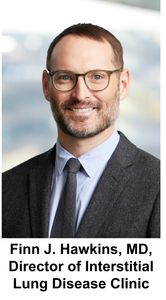 The Interstitial Lung Disease (ILD) clinic at BMC provides expert care for individuals with a variety of interstitial lung diseases including idiopathic pulmonary fibrosis, hypersensitivity pneumonitis, autoimmune related lung disease (including systemic sclerosis, rheumatoid arthritis, Sjogren’s syndrome, polymyositis), cryptogenic organizing pneumonia, and familial pulmonary fibrosis. The goal of ILD clinic is to provide comprehensive care to our patients and to improve our understanding of, and treatment options for, these diseases through multidisciplinary clinical care and research. Central to ILD clinic is a twice monthly multidisciplinary meeting to review ILD cases attended by pulmonologists, rheumatologists, chest radiologists, and pathologists. Trainees who choose to rotate through ILD clinic will learn how to characterize radiologic patterns of ILD, familiarize with hallmark pathologic findings in various forms of ILD, and gain experience in the management of these patients including anti-fibrotic and immunosuppressive therapies as well as when to refer for lung transplantation.
The Interstitial Lung Disease (ILD) clinic at BMC provides expert care for individuals with a variety of interstitial lung diseases including idiopathic pulmonary fibrosis, hypersensitivity pneumonitis, autoimmune related lung disease (including systemic sclerosis, rheumatoid arthritis, Sjogren’s syndrome, polymyositis), cryptogenic organizing pneumonia, and familial pulmonary fibrosis. The goal of ILD clinic is to provide comprehensive care to our patients and to improve our understanding of, and treatment options for, these diseases through multidisciplinary clinical care and research. Central to ILD clinic is a twice monthly multidisciplinary meeting to review ILD cases attended by pulmonologists, rheumatologists, chest radiologists, and pathologists. Trainees who choose to rotate through ILD clinic will learn how to characterize radiologic patterns of ILD, familiarize with hallmark pathologic findings in various forms of ILD, and gain experience in the management of these patients including anti-fibrotic and immunosuppressive therapies as well as when to refer for lung transplantation.
Faculty: Finn J. Hawkins, MBBCh; Konstantinos Alysandratos, MD, PhD; Kevin C. Wilson, MD; Divya Shankar, MD
BMC Alpha-1-antitrypsin Deficiency Clinic
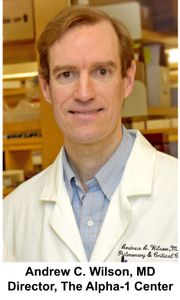 The Alpha-1 Antitrypsin Deficiency Clinic (aka The Alpha-1 Center) is a clinic focused on care for patients with mutations in the SERPINA1 gene responsible for alpha-1 antitrypsin deficiency (AATD). One of the largest AATD clinics in the Northeast, patients come to BMC from across New England to be evaluated. Initial clinic visits are comprehensive, lasting 1.5 hours, and provide a full evaluation together with significant patient education and genetic counseling in addition to routine clinical care. Patients are evaluated for and enrolled in a variety of observational research studies and clinical trials. Patients with a variety of mutations and combinations of mutations are seen in clinic, with disease manifestations most commonly including COPD, emphysema, bronchiectasis with associated complications, liver disease, and panniculitis.
The Alpha-1 Antitrypsin Deficiency Clinic (aka The Alpha-1 Center) is a clinic focused on care for patients with mutations in the SERPINA1 gene responsible for alpha-1 antitrypsin deficiency (AATD). One of the largest AATD clinics in the Northeast, patients come to BMC from across New England to be evaluated. Initial clinic visits are comprehensive, lasting 1.5 hours, and provide a full evaluation together with significant patient education and genetic counseling in addition to routine clinical care. Patients are evaluated for and enrolled in a variety of observational research studies and clinical trials. Patients with a variety of mutations and combinations of mutations are seen in clinic, with disease manifestations most commonly including COPD, emphysema, bronchiectasis with associated complications, liver disease, and panniculitis.
BMC Amyloidosis Clinic
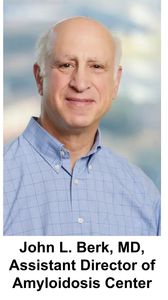 Amyloidosis Clinic is a multidisciplinary referral operation run by the internationally renowned Amyloidosis Center at Boston University Medical Center. New referrals and follow up patients undergo comprehensive testing and subspecialty consultations over a 3 day period. Team meetings occur after full data reporting on Fridays, generating consensus recommendations for treatment and disease surveillance. The clinic team includes 3 hematologists, 2 nephrologists, 3 cardiologists, a rheumatologist, an endocrinologist, a urologist, 2 neurologists, 2 otolaryngologist, a radiation oncologist, 3 nurse practitioners, a genetic counselor, and a pulmonologist. Patients are actively recruited to clinical trials. All types of amyloid are encountered. Pulmonary amyloid cases include tracheobronchial amyloid, nodular and nodular cystic lung amyloid, laryngeal and sinus amyloid, pleural and alveolar-septal amyloid, light chain deposition disease, and plasmacytomas.
Amyloidosis Clinic is a multidisciplinary referral operation run by the internationally renowned Amyloidosis Center at Boston University Medical Center. New referrals and follow up patients undergo comprehensive testing and subspecialty consultations over a 3 day period. Team meetings occur after full data reporting on Fridays, generating consensus recommendations for treatment and disease surveillance. The clinic team includes 3 hematologists, 2 nephrologists, 3 cardiologists, a rheumatologist, an endocrinologist, a urologist, 2 neurologists, 2 otolaryngologist, a radiation oncologist, 3 nurse practitioners, a genetic counselor, and a pulmonologist. Patients are actively recruited to clinical trials. All types of amyloid are encountered. Pulmonary amyloid cases include tracheobronchial amyloid, nodular and nodular cystic lung amyloid, laryngeal and sinus amyloid, pleural and alveolar-septal amyloid, light chain deposition disease, and plasmacytomas.
BMC Sarcoidosis Clinic
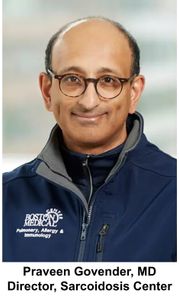 The Sarcoidosis Clinic (aka the Sarcoidosis Center) at BMC provides state-of-the-art diagnostic and therapeutic services for patients with sarcoidosis. Patients with sarcoidosis are referred to the Sarcoidosis Clinic from both within BMC as well as from throughout New England and the United States and from numerous foreign countries. Some patients come only for an initial evaluation or second opinion, while others may be followed for years. Trainees who choose to rotate through the Sarcoidosis clinic will learn about the diagnosis and initial assessment of patients with sarcoidosis as well as ongoing treatment for multi-system sarcoidosis including lung, skin, cardiac, and neurologic involvement and use of immunosuppressive therapies when indicated.
The Sarcoidosis Clinic (aka the Sarcoidosis Center) at BMC provides state-of-the-art diagnostic and therapeutic services for patients with sarcoidosis. Patients with sarcoidosis are referred to the Sarcoidosis Clinic from both within BMC as well as from throughout New England and the United States and from numerous foreign countries. Some patients come only for an initial evaluation or second opinion, while others may be followed for years. Trainees who choose to rotate through the Sarcoidosis clinic will learn about the diagnosis and initial assessment of patients with sarcoidosis as well as ongoing treatment for multi-system sarcoidosis including lung, skin, cardiac, and neurologic involvement and use of immunosuppressive therapies when indicated.
BMC Lung Nodule Clinic
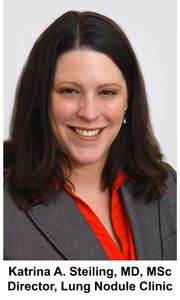 The Lung Nodule Clinic is the hub of a multidisciplinary program focused on early lung cancer detection and management at Boston Medical Center. Founded in 2014, this pulmonary outpatient clinic focuses on the evidence-based evaluation and management of indeterminate or suspicious pulmonary nodules identified on diagnostic or screening imaging of the chest.
The Lung Nodule Clinic is the hub of a multidisciplinary program focused on early lung cancer detection and management at Boston Medical Center. Founded in 2014, this pulmonary outpatient clinic focuses on the evidence-based evaluation and management of indeterminate or suspicious pulmonary nodules identified on diagnostic or screening imaging of the chest.
The Lung Nodule Clinic works closely with the BMC’s high-volume Lung Cancer Screening Program to ensure timely evaluation of patients with abnormal screening results. BMC is accredited by the American College of Radiology as a Lung Cancer Screening Center. The Lung Nodule Clinic also partners with the Department of Radiology and Department of Quality and Patient Safety to ensure timely evaluation of patients with incidental imaging findings in the lungs obtained in high-risk settings such as the Emergency Department or inpatient services.
The Lung Nodule Clinic collaborates closely with the Division of Thoracic Surgery to provide multidisciplinary evaluation of patients with lung cancer. The multidisciplinary Thoracic Oncology team is comprised of physicians experienced in pulmonology, thoracic surgery, chest radiology, interventional radiology, pathology, medical oncology, and radiation oncology. The team meets weekly to review diagnostic and treatment options for individual patients. Pulmonary faculty and trainees provide preoperative assessment, bronchoscopic diagnosis and staging of thoracic tumors, and continuity of care post-operatively to support survivorship.
BMC Pleural Disease Clinic
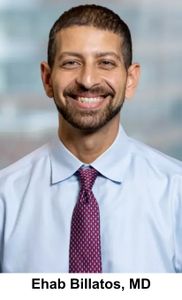 Pleural disease clinic at BMC is intended for the follow-up of post-hospitalization patients, management of long term indwelling pleural catheters, and work-up and evaluation of new pleural effusions.
Pleural disease clinic at BMC is intended for the follow-up of post-hospitalization patients, management of long term indwelling pleural catheters, and work-up and evaluation of new pleural effusions.